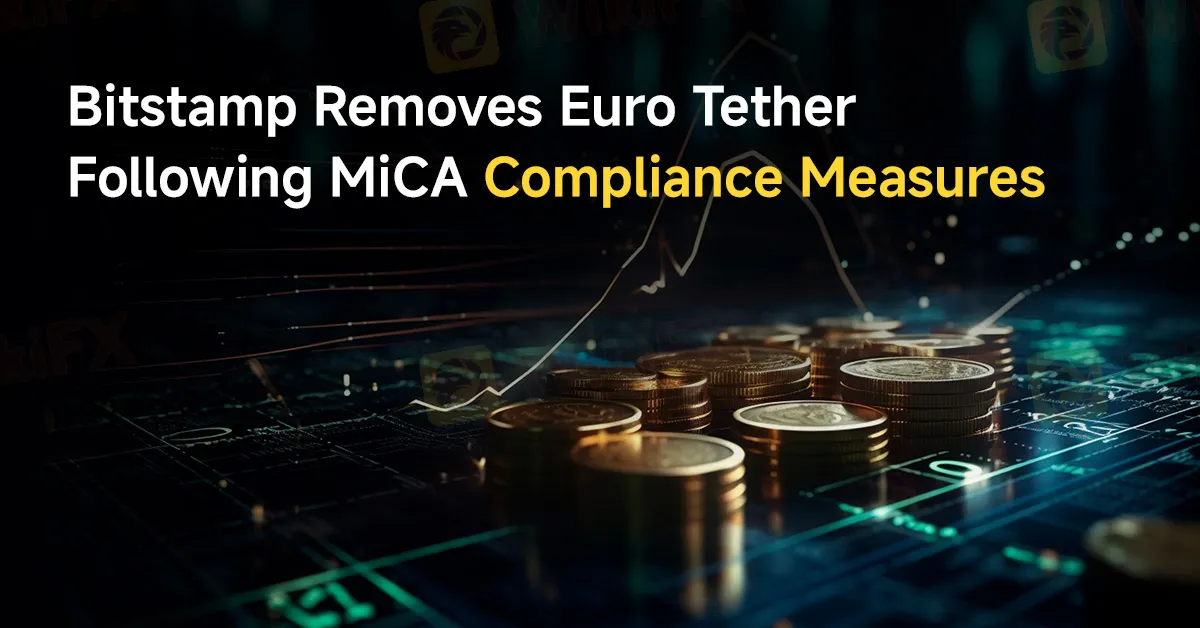简体中文
繁體中文
English
Pусский
日本語
ภาษาไทย
Tiếng Việt
Bahasa Indonesia
Español
हिन्दी
Filippiiniläinen
Français
Deutsch
Português
Türkçe
한국어
العربية
Bitstamp Removes Euro Tether Following MiCA Compliance Measures
Abstract:Bitstamp is preparing for the imminent full enforcement of Europe’s Markets in Crypto-Assets Regulation (MiCA) by announcing its decision to delist Euro Tether (EURT).

Bitstamp, a leading cryptocurrency exchange, is preparing for the imminent full enforcement of Europes Markets in Crypto-Assets Regulation (MiCA) by announcing its decision to delist Euro Tether (EURT), a stablecoin pegged to the euro.
This strategic move comes ahead of the MiCA regulation taking effect on June 30, underscoring Bitstamps commitment to full compliance with emerging European regulations.

Introduced in November 2021, Euro Tether was one of the initial euro-denominated stablecoins on Bitstamp. Despite its early adoption, EURT's market capitalization has drastically decreased from approximately $236 million in February 2022 to around $33 million currently, according to CoinGecko.
This decline is notable given that Tether, the issuer of EURT, also operates USD Tether (USDT), the largest stablecoin by market value at over $110 billion.
James Sullivan, Bitstamp‘s managing director for the United Kingdom, discussed the exchange’s proactive stance on MiCA compliance. He explained that Bitstamp has always supported a balanced regulatory approach to protect consumers while fostering cryptocurrency growth. Sullivan emphasized that Bitstamps strong compliance and security foundation positions it well to adapt to regulatory changes with minimal customer disruption. The delisting of EURT, he noted, would impact only a small percentage of clients with euro-pegged stablecoin portfolios.
Beyond the EURT delisting, Bitstamp clarified its approach to other Electronic Money Tokens (EMTs) not denominated in euros. These EMTs will remain available but with some usage restrictions for European customers. Bitstamp also stated it would neither list new EMTs that fail to meet MiCA standards nor promote such tokens.
In contrast, other cryptocurrency exchanges have taken more extensive measures in response to MiCA. Uphold, for example, delisted USDT and six other stablecoins on June 18 to align with the new regulatory framework. Additionally, Tethers CEO, Paolo Ardoino, has publicly criticized MiCA, stating that the company had no plans to comply.
Binance, another major cryptocurrency exchange, is also making adjustments for MiCA compliance. The exchange is notifying European users about changes to their services, specifically categorizing stablecoins as “regulated” or “unauthorized” based on their adherence to the new rules. Binance aims to transition users from unauthorized to regulated stablecoins and plans to implement a “sell-only” strategy for unauthorized stablecoins via its Binance Convert function, gradually phasing out non-compliant tokens.
Currently, only a few stablecoins meet MiCAs requirements, but Binance is prepared to navigate this regulatory landscape by facilitating user transitions to compliant stablecoins.
These proactive adjustments by major exchanges like Bitstamp and Binance underscore significant shifts in the cryptocurrency market as operators align with new regulatory landscapes. Their efforts aim to create a safer, more standardized environment for crypto asset trading across Europe, reflecting a broader movement within the financial technology sector to embrace regulatory changes that enhance consumer protection and market stability.

Disclaimer:
The views in this article only represent the author's personal views, and do not constitute investment advice on this platform. This platform does not guarantee the accuracy, completeness and timeliness of the information in the article, and will not be liable for any loss caused by the use of or reliance on the information in the article.
Read more

UK Authorities Freeze Nearly $7.7 Million in Illicit Crypto Assets Within a Year
Crypto wallets tied to fraud and tax evasion were frozen under new enforcement powers granted in 2024.

Webull Launches SMSF Investment Platform with Zero Fees
Webull introduces commission-free SMSF trading, offering over 3,500 US and Australian ETFs, with no brokerage fees and enhanced portfolio tools.

Australian Authorities Joins Forces with Philippine Authorities to Combat Cyber Scams
AFP tackles cyber scam boiler rooms in the Philippines, training police to fight fraud and protect Australians from romance and cryptocurrency scams.

Steam Set to Launch Blockchain Game “Paradise” Amid Scam Allegations
“Paradise,” a blockchain-based game accused of being a crypto scam, is set for release on Steam, sparking concerns over platform’s ban enforcement and consumer risks.
WikiFX Broker
Latest News
How Crypto Trading Transforms FX and CFD Brokerage Industry
FCA Warns Against 10 Unlicensed or Clone Firms
CySEC Warns Against 14 Unlicensed Investment Websites
Top Currency Pairs to Watch for Profit This Week - March 31, 2025
Will natural disasters have an impact on the forex market?
Philippines Deports 29 Indonesians Linked to Online Scam Syndicate in Manila
Exposing the Top 5 Scam Brokers of March 2025: A Closer Look by WikiFX
Gold Prices Climb Again – Have Investors Seized the Opportunity?
Webull Launches SMSF Investment Platform with Zero Fees
Australian Regulator Warns of Money Laundering and Fraud Risks in Crypto ATMs
Currency Calculator








